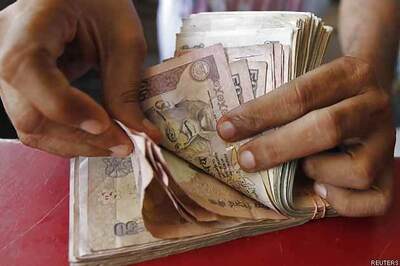
views
In a holiday season that many of us will spend apart from loved ones, gift-giving might feel even more important than usual. After all, if you cant travel to see family, at least you can see them unwrap gifts over a video call, right?
And just as many families will use a video service for holiday celebrations this year, many will also turn to credit cards to cover their expressions of love. Three-quarters of holiday shoppers are planning to use credit cards to purchase gifts this year, according to a NerdWallet survey of 2,049 U.S. adults conducted online by The Harris Poll.
Using credit cards can be a great way to earn rewards or get cash back, but make sure you know how to dig out of the debt you ring up. Otherwise, you might be still paying off the debt late into next year, something 33% of 2019 holiday shoppers who used credit cards said they were still doing when surveyed in September.
Heres how to handle holiday debt.
TAKE STOCK OF WHAT YOU OWE AND WHAT YOU CAN PAY
First, catalog your holiday debt. Log into each credit account and note the balance and interest rate. Consider creating a simple spreadsheet or using a debt tracker to keep accounts organized. If you have debt thats not on a credit card, such as a shopping loan from a company like Klarna, list that, too.
With your debts sorted, turn to your budget. The 50/30/20 budget is an easy template. With this approach, half of take-home pay goes toward necessities, like housing and groceries. Then, 30% goes toward wants, like takeout or a nice bottle of Champagne to celebrate bidding farewell to 2020 on New Years Eve. Lastly, 20% of your income goes toward debt and savings.
As you hash out your budget, pin down how much money you can allocate toward debt each month. Divide the total debt by that amount to estimate how fast you can rid yourself of debt, keeping in mind that accruing interest can increase the balances.
Focusing on what you can pay monthly helps make your debt more manageable, says Kathleen Burns Kingsbury, a Vermont-based wealth psychology expert who helps people understand the personal factors of money decisions.
Ask what you can reasonably pay off each week or each month and really work at achieving it, Burns Kingsbury says. From a psychological standpoint, this helps you feel a sense of success, and the more successful you feel, the more motivated you are to continue that behavior.
FIND YOUR PAYOFF PATH
Your best route to resolving holiday debt depends on your cash flow, credit score and personal preferences. Here are a few:
PAY OFF THE FULL BALANCE WITH THE FIRST STATEMENT: If you have the cash, this is the fastest way to deal with debt and the cheapest, since you avoid paying interest. According to the NerdWallet shopping survey, 35% of holiday shoppers who added credit card debt in 2019 took this approach.
ROLL A SNOWBALL OR KICK OFF AN AVALANCHE: The debt snowball and debt avalanche are two popular debt payoff methods. Which is right for you depends on your financial priorities.
With the debt snowball method, you focus on paying off the smallest balance first, then roll the amount you were paying on that first debt into the next largest. The amount youre paying on the focus debt keeps growing, like a snowball rolling downhill. You might choose this if you need the early wins from paying off the first accounts to keep you motivated.
The debt avalanche method may be best if you want to pay as little in interest as possible. With this route, you prioritize paying off the debt with the highest interest rate first, regardless of balance size. Again, when that first debt is done, you put the amount you were paying on that into the next highest interest account, repeating until youre debt-free.
CONSIDER A BALANCE TRANSFER CARD: To avoid costly credit card interest, look into taking out a balance transfer credit card with a 0% APR promotional period, says Mike Cocco, an Equitable financial adviser based in Nutley, New Jersey.
Once you have that, youre eliminating interest, which can allow you to pay off debt a lot quicker, Cocco says. Then, be cognizant of when the 0% APR period runs out and work backwards to create a reverse Christmas Club for paying off your debt. If you have $1,000 on the card and 12 months interest-free, you have to pay at least $83 a month.
To get a 0% balance transfer offer, youll need good to excellent credit. In general, that means a score of 690 or higher, although credit scores alone dont guarantee approval. Issuers will look at your income, existing debts and other information.
Regardless of which debt payoff method you choose, the important thing is to find a plan and commit to it. Taking decisive action to resolve your debt can ensure you are debt-free faster and maybe let you start building up savings for the 2021 holiday season.
_________________________________
This column was provided to The Associated Press by the personal finance website NerdWallet. Sean Pyles is a writer at NerdWallet. Email: [email protected]. Twitter: @SeanPyles.
RELATED LINKS:
NerdWallet: Tackle Your Debt with a Debt Tracker https://bit.ly/nerdwallet-debt-tracker
Disclaimer: This post has been auto-published from an agency feed without any modifications to the text and has not been reviewed by an editor
Read all the Latest News, Breaking News and Coronavirus News here
















Comments
0 comment